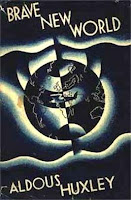
Ever since it was published, Aldous Huxley’s novel Brave New World has been considered a classic example of a dystopia. In the society Huxley describes, people are controlled through brainwashing and genetic control, and they are kept satisfied with drugs and sex. Anyone who does not follow submit to the control of the government is made a pariah and exiled to an island. Obviously Huxley wrote the book with the intent of describing the dangers of this kind of society, and to exhort the reader to prevent it from becoming a reality. To almost everyone, this image is disgusting and unbearable.
But recently I have been wondering—why do we look down on the type of society described in the novel? Though I’m not sure if I totally abjure Huxley’s ideas, I think there is definitely room to question them.
To figure this out, I think, we have to look into the nature and purpose of society, government, and morals.
First, let’s examine BNW’s World State on a practical level, ignoring morals for the moment. The World State has no war, no crime, and a balanced economy. Everyone has more than enough to eat, and plenty of creature comforts. Everyone performs their job with brio, and everyone enjoys their occupation. Their social conditioning separates everyone into castes, but people are gregarious nonetheless. The have banished racism, sexism, and every form of prejudice. To summarize—they function far more efficiently than we could ever hope to.
Though the World State may be practical, most people feel it is lacking morally. No matter what your faith or morals are, you are probably offended by BNW’s bacchanalian orgies, its draconian eugenics, and its employment of various brainwashing methods. However, we must look beyond our initial reactions and dig deeper—what is actually wrong with these things? Remember that we are judging BNW by our own moral code—but the World State has its own moral code, which is drastically different from ours. Almost all moral codes in existence today stem from some form of religion or faith; BNW’s does not. Instead, the purpose of the World State’s moral code is to ensure stability and uniformity.
How, then, can we morally assess Brave New World? The answer, I think, has to do with happiness, which may be the only common ground between two moral systems. If we look at BNW this way, its draconian methods are more than justified because it created much more happiness for its citizens than we can even imagine. Also, remember that the people of the World State are not disgusted by their system because it is what they are used to. In fact, they would most likely find or system more disgusting than we find theirs. To summarize—the ends justify the means, since the means are only “wrong” by our standards.
On a related note, many people criticize the World State’s “artificial happiness. ” But what is this so-called fake happiness? I believe it to be nothing more than a confusion of terms and morals. Happiness can be defined medically as a state associated with a release of endorphins in the brain. The fact that in BNW this is mostly brought about through drugs and sex is not important—it still qualifies as happiness medically, proving the idea of “fake happiness” wrong.
That said, the World State is not perfect. There are numerous practical flaws in the system, the most glaring being (as I mentioned before) that the State’s structural integrity would collapse that the collapse if a crisis occurred, since people can no longer be self-sufficient. For the most part, though, it runs like perfect clockwork, with the exception of a few aberrations like John the Savage. Morally, I have almost no problems with it, as I explained. Though it may seem difficult to accept, the system Brave New World describes may be far closer to perfect than ours.

No comments:
Post a Comment